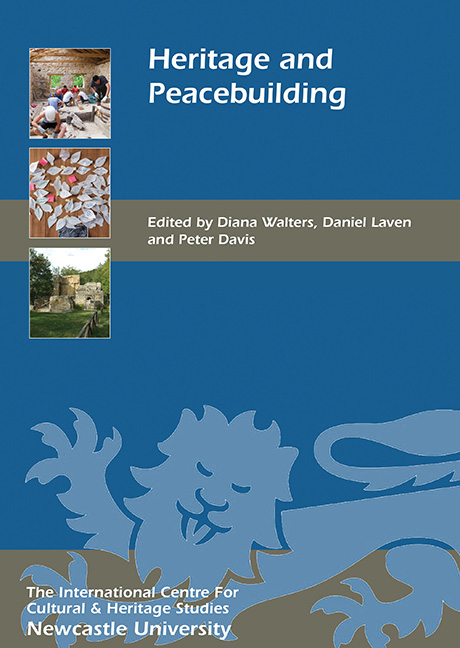Book contents
- Frontmatter
- Contents
- List of illustrations
- Acknowledgements
- List of abbreviations
- Preface
- Introduction
- NEW AND EMERGING IDEAS AROUND HERITAGE AND PEACE
- HERITAGE AND PEACEBUILDING IN PRACTICE
- HERITAGE, PEACEBUILDING AND SITES
- 14 A Conversation with Yongtanit Pimonsathean: Managing Conflict in Thailand
- 15 Challenging the Roots of Prejudice: the Monte Sole Case Study
- 16 Mau Mau: the Divisive Heritage of Liberation Struggle in Kenya
- 17 The Heritage of Geopolitical Borders as Peace Tourism Attractions
- 18 Rebuilding the Broken: Regional Restoration Camps as a Meeting Platform in the Western Balkans
- 19 Conflict or Reconciliation? Industrial Heritage Practices at a Turning Point
- 20 A Conversation with Saleem Ali: Environmental Challenges and Conflict Resolution
- List of Contributors
- Index
- Previous Titles
15 - Challenging the Roots of Prejudice: the Monte Sole Case Study
from HERITAGE, PEACEBUILDING AND SITES
Published online by Cambridge University Press: 16 February 2018
- Frontmatter
- Contents
- List of illustrations
- Acknowledgements
- List of abbreviations
- Preface
- Introduction
- NEW AND EMERGING IDEAS AROUND HERITAGE AND PEACE
- HERITAGE AND PEACEBUILDING IN PRACTICE
- HERITAGE, PEACEBUILDING AND SITES
- 14 A Conversation with Yongtanit Pimonsathean: Managing Conflict in Thailand
- 15 Challenging the Roots of Prejudice: the Monte Sole Case Study
- 16 Mau Mau: the Divisive Heritage of Liberation Struggle in Kenya
- 17 The Heritage of Geopolitical Borders as Peace Tourism Attractions
- 18 Rebuilding the Broken: Regional Restoration Camps as a Meeting Platform in the Western Balkans
- 19 Conflict or Reconciliation? Industrial Heritage Practices at a Turning Point
- 20 A Conversation with Saleem Ali: Environmental Challenges and Conflict Resolution
- List of Contributors
- Index
- Previous Titles
Summary
Monte Sole is an extensive mountainous area located between two valleys formed by the Reno River and the Setta Creek in the southern part of the province of Bologna, Italy. During World War II this area was the theatre for one of the greatest massacre of civilians in Western Europe. The Peace School Foundation of Monte Sole, which was created in 2002, has its registered office and operating facilities in the Historical Park of Monte Sole, founded in 1989 by a law of the Emilia Romagna Region. Its aim is to promote non-formal training and peace education projects, non-violent conflicts transformation, the respect of human rights, peaceful cooperation between different people and cultures and a society without xenophobia, racism and any other form of violence towards human beings and their environment.
The territories – large and small – that have experienced the suffering of innocents caused by their neighbours, cannot be looked at now without taking into consideration the violence they were witness to. Molecules, atoms, even the interstices of the sub-matter of those places are full of it. […] What should a democratic society do with these areas? Should it fence them and make them inaccessible? Make them a museum? Such solutions, in my opinion, would result in unfairness and uselessness. I think that only a laborious, intense work of decontamination could give those places back to people.
(M Ovadia, Un luogo contaminato, in Sarti 2001; author's translation)To have a Peace School in Monte Sole means trying to decontaminate the place, going beyond the mere conservation of memory. The Peace School is not, and cannot be, a place in which certain people disseminate the ‘right values’ to unaware or unenlightened people. It is not and cannot be an institution that uses heritage to speak for itself, believing that this alone would manifest a certain benevolent inner and innate power for good. The Peace School is – and aims to be more and more – a place separated from the frenzy of everyday life, a place in which different people meet in order to study, to experience the complexity of and the unanswerable questions about human beings, to share the beauty and the difficulty of intellectual and emotional research that does not accept a hierarchy of ideas but affirms a multiplicity of free contributions.
- Type
- Chapter
- Information
- Heritage and Peacebuilding , pp. 165 - 178Publisher: Boydell & BrewerPrint publication year: 2017



